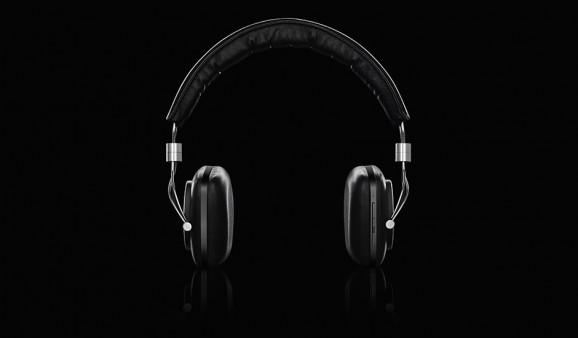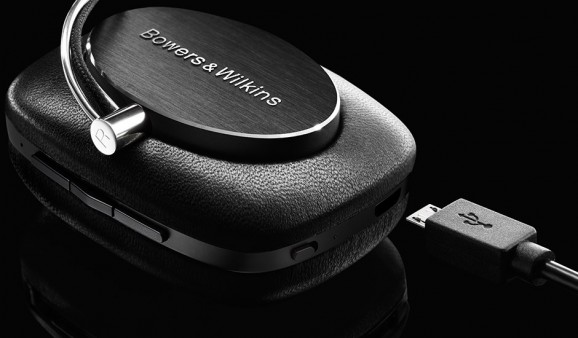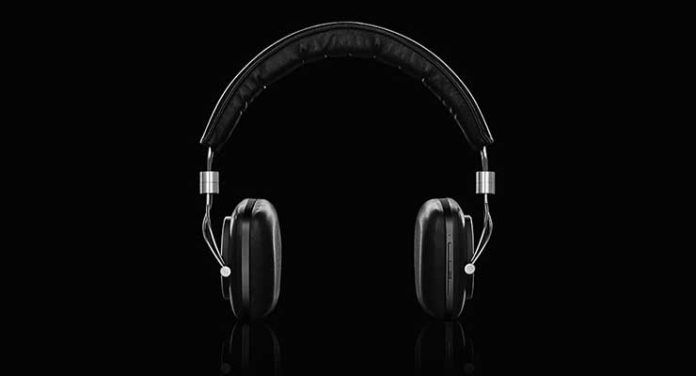Bowers &Wilkins has leveraged their considerable experience in loudspeaker design and manufacture to take on the challenges of making private and portable listening devices. I have enjoyed the B&W P5 Series 2 ‘phones for the past couple of years and when B&W’s PR. guy John Nicoll told me that the company had launched a wireless version, aptly named the P5 Wireless, I immediately requested a review sample.
Cutting the Cord

The P5 Wireless looks just like its P5/Series 2 sibling with the same comfortable ear pads and headband, nifty-looking black aluminum façades over each earpiece, and adjustable earpiece rails. But the P5/2 is strictly plug-and-play while the P5 Wireless is, well, wireless. The “magic act” starts when the button on the bottom of the right earpiece is pushed to the right, activating a green light. When this button is depressed, the light begins to blink blue and the headphones can then be mated via Bluetooth v4.1 to a compatible music source. Since the P5 Wireless has an aptX-equipped receiver, it can play music files with resolutions up to CD-quality (44kHz/16-bit); higher resolution sources will default to this resolution as well. The back of the right ear speaker has buttons for volume control and play/pause/track selection. A micro-USB 2.0 socket connects the supplied USB cable that, when connected to a computer, fully charges the lithium-ion battery in three hours for seventeen hours’ playing time. The indicator light shows the charge remaining: green at least 30%, yellow 10% to 30%, and red below 10%. If no signal is detected for twenty minutes, the P5 automatically enters “sleep” mode to save power but can be awakened by sliding the power button to the right.
A 3.5 mini-plug stereo cable is available for wired listening. Remove the left ear pad and plug it into the receptacle; the right ear pad is also removable if a hard reset is needed. When the P5 Wireless is wired, it conserves power (particularly if the battery is low) and allows the headphones to be used with non-Bluetooth devices. In this mode, higher resolution files (up to native 96kHz/24-bit with my Audirvana Plus DAC) can be played; those with higher sampling rates are down-converted.
The P5 Wireless phones have the same 40 mm CCAW moving coil drivers with nylon-damped diaphragms as the P5/Series 2. These closed back, supra-aural units provide reasonable if not total sound isolation from the outside world. The phones weigh 213 g (about 30 g more than the P5/Series 2s) yet remained quite comfortable during extended listening sessions. With a 22 Ω nominal impedance (the same as the P5/2s), the P5 Wireless will be a friendly fit for most portable players.

The Wireless Experience Begins
The P5 Wireless phones sounded pretty damn good right out of their luxurious quilted black carrying case and sounded even better after a number of hours of playing time. This result was exactly what I had experienced with the P5/2s so I was not surprised at the improvement in the entire sound spectrum: more open highs and mids; deeper, cleaner bass.
I listened in both wireless and wired modes, as many listeners will take advantage of both options. Pairing with my MacBook Air and iPhone 6 was quick and easy. I was pleasantly surprised that a firm signal connection was maintained at distances of nearly 20 feet. I also connected an Astell&Kern AK240 portable digital player but only in wired mode as its Bluetooth transmitter would not recognize the P5 Wireless. Among the many musical selections I used were the following:
- Esmeralda Spalding: Chamber Music Society “Inutil Paisagem” (96kHz/24-bit)
- Jeremy Monteiro: A Song for You “A Song for You” (DSD)
- Radkha Toneff: Fairytales “The Moon is a Harsh Mistress” (44kHz/16-bit)
- Michael Jackson: Thriller: “PY.T. (Pretty Young Thing)” (DSD)
- The Eagles: Hell Freezes Over “Hotel California” (44kHz/16-bit)
- Eiji Oue/Minnesota Orchestra: Rachmaninoff — Symphonic Dances (176kHz/24-bit)
- Joel Fan: West of the Sun “Nazareth” (176kHz/24-bit)
- Sonny Boy Williams: Keep It To Ourselves “The Sky is Crying” (44kHz/16-bit)
- Lise & Gertrud: Live from Sodra Teatern “Eleanor Rigby” (44kHz/16-bit)
A bunch of mp3 files were sampled as many young listeners on the go have libraries chock-full of this low-resolution format: Boyzone (“No Matter What”), the Spice Girls (“Get Down”), Celia Cruz (“Yo Vivere”), Robby Robertson (“Somewhere Down a Crazy River”), and Dire Straits (“Sultans of Swing”).
To complete the loop, I conducted multiple A/B comparisons of the wired and wireless P5 to the wired P5/2 on the same material and with all of the sound sources (iPhone, MacBook Air, AK 240) in play. Cutting to the chase, as wired devices both phones sounded identical (as they should have) and nearly identical in the wireless mode with just a smidge less space and bass. These new phones are warm and voice-friendly, extract considerable detail, and provide extraordinary bass slam for such small driver units. In sum, the P5 Wireless headphones acquitted themselves quite capably on all of the items on the review playlist.

The Final Assessment
At a hundred bucks more than the conventionally wired P5/Series 2 headphones, are the P5 Wireless phones a good value? No they are not, they are a great value! You get all of the virtues of conventional headphones plus the added convenience of cordless listening. I have heard other “high-end” wireless headphones and I can tell you that the P5 Wireless bests them all. Unlike older Bluetooth headphones, they benefit from the updated aptX codec and receiver and yield very little (if any) sonic ground to their wired operation. As a frequent flyer, I can imagine myself in the friendly skies, reclining in a comfy seat with a nice beverage in my hand and smiling broadly as my favorite tunes waft wirelessly out of my iPhone and into my ears through the P5 Wireless headphones. Highly recommended.
Specifications
- Distortion (THD) <0.4% for 1 kHz/10mW
- Sensitivity 109dB/V @ 1 kHz
- Inputs 3.5 mm Stereo mini-jack (on cable)
- USB Micro USB 2.0 (Charging, FW Update)
- Drive Units 2 x 40mm full range
- Impedance 22 ohms
- Frequency range 10 Hz to 20k Hz
- Weight 213 g
- Comfortable
- Excellent bass (particularly in wired mode)
- Wide dynamic range
- Good detail recovery
- Superior build quality
- Long battery life
- No wires needed
- May not connect with some Bluetooth-enabled devices
- Not complete isolation
Be the first to leave a review.


